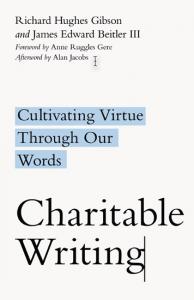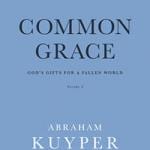What’s best in writing is to crush our enemies, see them driven before us, and hear the lamentation of their women. At least, so goes the assumed backdrop of most non-fiction writing. But is that how Christians should write? Should we pick up our pen, sit down at our keyboard, or cut and paste (because apparently plagiarism is ‘in’ this decade) with the goal of winning a victory for the Lord?

Not according to Richard Gibson and James Beitler. In their new book Charitable Writing: Cultivating Virtue Through Our Words they argue that Christians should approach writing not as a battle to be won but rather as a banquet to be displayed, shared, and enjoyed.
That tells us right away that this book isn’t concerned with giving us hints, tips, and tricks for writing. Nor does it cover the rules of grammar or other conventions of the language. Those things are all important (the authors emphasize that regularly), but they aren’t the focus here. Instead, Charitable Writing is concerned with helping believers establish a proper disposition for writing. Namely, we should be humble, loving, and careful in our writing. We should approach writing as if we were laying out a feast to which all who wish to come are welcome:
“The purpose of a banquet is not to win. Banquets are celebrations; ideally, all participants benefit by joining in. Those benefits aren’t simply material–as in a good meal or a nice souvenir–but intellectual and relational…. a banquet provides abundant opportunity for conviviality. Similarly, a piece of writing can be an opportunity to draw readers in, to help them feel welcome.” (112)
Practically, this book is excellent and well worth reading. It will help the reader move towards a healthier and, more importantly, more faithful attitude about writing. And while I’m not sure the framing device the authors use (various pieces of visual art) works quite the way they want it to (the transition of the image to small black and white pictures undoubtedly undermines some of the intended punch), overall the arguments made are both true and strong and hence stand well on their own.
With that said, I think there are two issues that could stand a bit more working out:
- The advice in this book is advice anyone can take, it’s not tied to Christianity. Humility, love, and care, are virtues that many different religions and worldviews can and do embrace. Obviously as Christians we have (or at least, should have) a different motivation for pursuing these virtues–namely, our purchase into the Kingdom of God through the substitutionary sacrifice of Jesus Christ on the cross, but that’s not to say that others can’t pursue these virtues for other reasons–even worldly reasons, at times.
And I think that ties in to something authors say at the beginning. They note that Charitable Writing began in reflections on their own work in the classroom. They observed that their classroom in a Christian setting looked basically the same as any other writing classroom anywhere else in higher education. This, for them, is a problem.
And yet, I think (though I am open to correction here) that they’re wrong. Maybe I’m reading too much of my own discipline (Political Science) into theirs (English), but if they are teaching well then in a sense it shouldn’t matter what the setting is. Writing is a common grace gift of God to the world, and doing it well isn’t going to look one way for a Christian and another way for a non-Christian. True, our motivations for writing might differ. As a non-Christian I might write to glorify myself, or to serve my political cause, or to benefit my friends, or any number of other reasons. As a Christian, these motivations should (again, emphasis on the “should”) decrease as I mature and slowly be replaced with the motivation of glorifying God and serving His people. But the substance of what we write and the style in which we write and the dispositions under which we pursue the craft of writing may very well remain unchanged. - There is still a place for, well, not non-charitable writing, I suppose. But… imprecatory writing? Jeremiads? I’m not sure exactly what term or category is. But to use the ‘banquet’ metaphor, at some point the announcement for the banquet needs to go out, and it needs to include a warning to those who refuse to come, a challenge to leave to those who are attempting to attend improperly, and a robust defense of the banquet as both the only true banquet and the one at which attendance is utterly necessary for life. Certainly the dispositions discussed in Charitable Writing must remain (and even be strengthened) in these types of writing; and it may be that in our internet click-bait age we’re too quick to pursue these kinds of writing; but nevertheless we need to be able to think in terms of warning, exclusion, a call to inclusion, and truth.
I think what I’m getting at here is that charity must govern our writing, but it does need to be the Biblical definition of ‘charity’ rather than the worldly one.
Again, those are minor quibbles–and I think not even really “quibbles” so much as “calls for further working out of the argument of the book.” But don’t take my word for it. Pick up Charitable Writing and let it help shape your writing into a more faithful and Godly disposition towards your readers.
Dr. Coyle Neal is co-host of the City of Man Podcast and an Associate Professor of Political Science at Southwest Baptist University in Bolivar, MO











